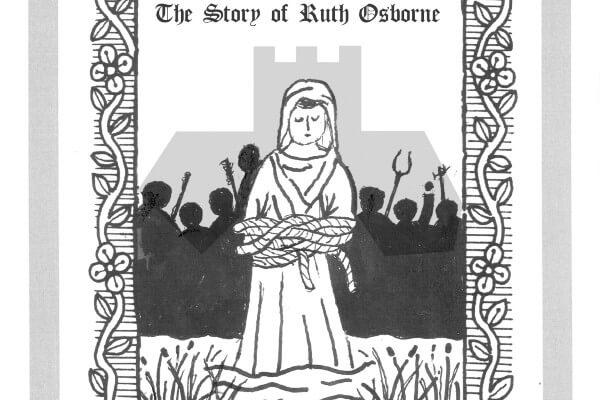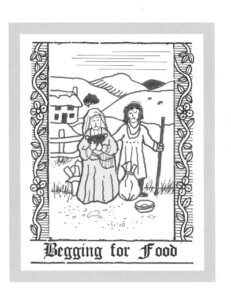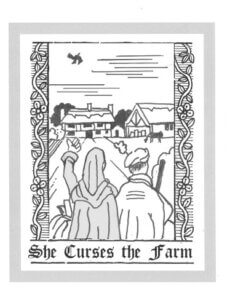The Witch that Never Was

Tring’s John Bly has recently published the story of Ruth Osborne (‘the Witch of Tring’), the last woman to be condemned to death for witchcraft in the UK.
John was inspired to find out more after reading her tale on the Tring Rural History website. Ruth’s fate is described in story form in the book by Alan Warner from Long Marston, one of the site’s founders. Below are extracts from the first two chapters of The Witch That Never Was.
Ruth Osborne’s story; Early April 1751
 We approach the door of the farmhouse and John knocks softly. No one comes to the door so he knocks again, much harder this time. A man opens the door and he has an angry look on his face.
We approach the door of the farmhouse and John knocks softly. No one comes to the door so he knocks again, much harder this time. A man opens the door and he has an angry look on his face.
‘What in God’s name do you want at this time of night?’ he says, in a loud and angry voice, matched by the expression on his face. ‘I remember you Osborne, if you’re here for a job you’re wasting your time. You’re far too old and I’ve got all the men I need’.
I decide to say something. ‘Mr Butterfield, kind sir. I’m Ruth Osborne. My husband’s not here for a job, we’re here to ask for you to help us by giving us some food, maybe some buttermilk. We’re starving and would appreciate anything you can give us. I can’t tell you how much we hate having to beg but we have no choice, we are desperate’.
He looks at me as if I’ve just crawled out of something. He replies: ‘I have no time for beggars, particularly strange people like you. Have you any idea what it’s like trying to make a living by farming these days? But I don’t go around asking others to help me. You can just b****** off and don’t come back or I’ll set my dogs on you.’
 My husband is well known for his temper and turns around to shout back at this awful man. But I put my hand on his arm and tell him that it is a waste of time and we should go.
My husband is well known for his temper and turns around to shout back at this awful man. But I put my hand on his arm and tell him that it is a waste of time and we should go.
‘Just leave him alone,’ I say to John. ‘People like him will rot in hell and damnation one day and they deserve it. A curse on him and his farm I say.’
Butterfield shouts again to me. ‘What did you say about me, you witch?’ ‘I wasn’t talking to you,’ I reply.
John Butterfield’s Story; mid April 1751
I just can’t cope any longer. I lost the last one of my calves today, some kind of disease that has been spreading into Wilstone and Puttenham these last few weeks and has somehow found its way into my herd. And I have lost two of my most reliable men because I had no money to pay them last week. So there is no one to see to my fields and care for my crops. I can’t work in the field myself because I’ve started getting these strange fits again.
Everything’s suddenly going wrong these last few weeks and I don’t know why. The Chapmans – who own the next farm along the road and have no cattle disease, typical – tell me that my bad luck is connected to that strange couple, the Osbornes, who came begging a few weeks ago. I decide that the best way of coping with all this is my favourite remedy, a jug of ale. But I have no ale left and decide that I will go along to the Queens Head and drink some more, maybe share my grievances with some of the other farmers and labourers who gather there most evenings.
I feel a need to tell everyone how unfair life has been to me. This starts a conversation in which everyone joins in. As the ale flows, the mood becomes more angry and my friends seem more and more determined to do something on my behalf.
They tell me that the only certain remedy is to submit the witch and wizard to a ducking, in the presence of the neighbourhood. Apparently we first have to send a message to the Town Crier in Hemel Hempstead, asking him, for a fee of four pence, to read out a notice of the impending ducking. One farmer is so keen that he agrees to draft the message himself and send one of his labourers to Hemel the next morning. He even writes it out before we split up. It says:
‘This is to give notice that on Monday next there is to be at Long Marston in the Parish of Tring, two ill-disposed persons to be ducked by the neighbours’ consent.’
What happened to Ruth? And why did a chimney sweep who attended the ducking get charged with murder? You can read the rest of the story and learn the fates of John Butterfield and John Osborne in the book, which is available from Tring Local History Museum, with proceeds going to charity.

